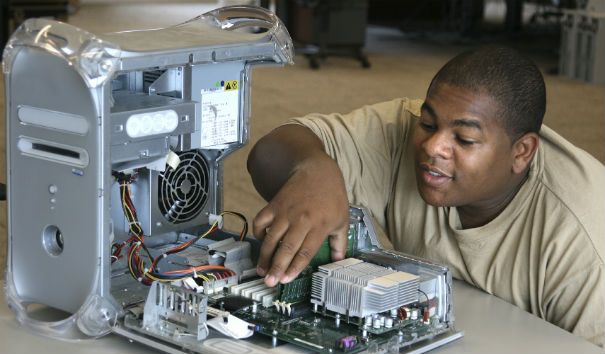Running a college isn't easy. Coordinating schedules, distributing scholarships, planning activities and keeping all that technology working takes a huge team of administrators and staff that many students go through their whole college career without ever even hearing about, even though it would be impossible to get an education without them working away behind the scenes.
Here are some quick profiles of just a few of the unsung heroes of the college experience, along with some employment tips in case you're thinking about support roles in higher education for your own career.
1. Disability services supervisor

"Statistics show that 10-15 percent of the student population has some sort of disability, whether physical, emotional, or learning," said Dr. Chester Goad, author and Board Member for the Association on Higher Ed and Disability, in an email interview. "Professionals in the disability support offices work to coordinate services such as interpreters for the deaf, assistive or adaptive technology, special software or other devices and much more."
The exact position title may be slightly different at your school — similar titles include accessibility program coordinator and disability services supervisor, among others — but the spirit of the position persists despite the title. Personnel in the disability services office work to ensure that campus facilities and amenities are equally accessible to all students and faculty, regardless of challenges to mobility or mentality.
"If you want to work in disability services, you'll want to be a problem solver who is flexible, passionate about working with college students, and interested in education, educational justice, access, etc.," Dr. Goad went on to say. "Degrees in education, disability management, rehabilitation, educational administration, special education, advocacy, or even educational technology are all helpful."
2. Facilities manager

In terms of quality of day-to-day life, this one is pretty high on the list. If your classrooms and other campus buildings have consistent electricity, sturdy plumbing, paint on the walls and working heat and A/C, then you have at least one facilities manager to thank for your relative comfort.
The activities administered by the facilities manager can be pretty expansive, with larger campuses employing dozens of coordinators and maintenance operatives who work to ensure that the lights stay on, the recycle bins get emptied and the elevators go smoothly up and down when you ask them to. They also may be in charge of establishing security policies, organizing budgets and schedules for campus upkeep or improvements and making sure all public and private spaces comply with health standards and environmental regulations.
The ins and outs of the facilities on a specific campus are usually learned on the job, and it's probably a good idea to add some leadership skills training into your education if you want to be in charge of the team that makes the campus tick. A bachelor's degree and relevant work experience may be sufficient at some institutions, while others prefer to hire managers with a master's degree.
3. Registrar

It's likely that you've been to see a registrar once or twice, or at least exchanged phone calls or emails with someone at the registrar's office. These are the wizards who somehow manage to coordinate the meeting times of hundreds of classes and then arrange the schedule requests of thousands of students to help each one stay steady on the path to graduation.
Registrars are also the ones you turn to when you need official transcripts and other such documentation, since they're in charge of the academic records of the entire institution. On top of that, it's often the responsibility of the registrar's office to plan and arrange commencement ceremonies at the end of each semester, which you'll likely soon see is a significant undertaking to say the least.
Working in the registrar's office might not be a bad career move, either, if you're thinking about working behind the scenes in academia. Salary.com lists the median annual registrar salary as $76,690 for 2015, with the bottom 10 percent earning up to $50,554 and the top 10 percent taking home more than $110,678 for the year. Consider a master's degree in education administration if interested in this career.
4. Information technology specialist

These days, most institutions consider fast and free-flowing digital access to be nothing short of a necessity for academic survival. Add that to the fact that most people only ever think about IT personnel when they're already in crisis mode — running late on the research for a big paper with no internet on their floor of the dorm, say — which can mean that IT services personnel on campus get fear and frustration directed at them more often than appreciation and kind words.
"Students and faculty often don't realize the work that goes on behind the scenes to make the educational world sync with the digital environment," Dr. Goad added. "Everyone is happy as long as the digital/IT world is not only functional but optimal. IT at colleges and universities works 24-7 to ensure that the online or digital world is optimal and that a level of security is followed to keep information safe and confidential."
Degree programs in computer science or information technology are what you want to focus on if interested in this helpful career. IT managers at colleges, universities and technical schools earned a mean annual wage of $108,750 in 2014, according to data from the U.S. Department of Labor's Bureau of Labor Statistics (BLS), but the specialists and other personnel who personally administer the networks and help you with your workstations may not get compensated nearly so handsomely. Try and remember to thank one next time they save your bacon — they probably deserve it.
5. Student affairs director

Imagine if you had responsibility for a sort of super-department at your school, one that oversees initiatives such as student health services, career services, admissions, athletics, counseling, Greek Life organizations, community engagement, veterans' affairs and emergency services, just to name a few. Intense, right?
Although not every school groups the complete list of above departments under the student affairs umbrella, student affairs directors do tend to have a lot on their plate. Most student affairs departments have at least three or four separate divisions — health services and campus recreation are especially common, along with student housing, nutrition, counseling and diagnostic testing at many institutions — and the director has to keep an eye on them all.
Most campuses employ a battery of student affairs coordinators and other administrators who report to the director, so take a few courses that teach delegation and other management skills if you think you might want a shot at a directorial position someday. Consider a degree in education or education administration to get started: Postsecondary education administrators earned a mean annual wage of $101,910, according to the BLS, and the 15 percent projected job growth by 2022 is faster than the national average.
How to appreciate the underappreciated
Even though it's likely that most of your school administrators aren't in the higher education game for the fame and glory, they do work hard to make sure your college or university stays as close to peak function as possible during your entire road to graduation. Whether you're going home for Thanksgiving or making it on your own this year, try and spare a grateful thought or two for the administrative powerhouses making it happen behind the scenes.
Sources:
1. Occupational Outlook Handbook, Bureau of Labor Statistics, U.S. Department of Labor: Postsecondary Education Administrators, http://www.bls.gov/ooh/management/postsecondary-education-administrators.htm; Administrative Services Managers, http://www.bls.gov/ooh/management/administrative-services-managers.htm; Computer and Information Systems Managers, http://www.bls.gov/ooh/management/computer-and-information-systems-managers.htm; Computer Support Specialists, http://www.bls.gov/ooh/Computer-and-Information-Technology/Computer-support-specialists.htm
2. Registrar Salaries, Salary.com, http://www1.salary.com/Registrar-salary.html
3. School pages: Administrative Departments, Carnegie Mellon University, http://www.cmu.edu/about/administrative.shtml; What is Student Affairs?, University of California Riverside, http://vcsa.ucr.edu/wisa/index.html; Departments, Student Affairs, Northwestern University, http://www.northwestern.edu/studentaffairs/vice-president/about-us/departments/index.html; Division of Student Affairs, Auburn University, http://www.auburn.edu/student_info/student_affairs/studentaffairs/; Student Affairs Departments, Georgia State University, http://studentaffairs.gsu.edu/departments-2/; Student Affairs Departments, Prairie View A&M University, http://www.pvamu.edu/sa/departments/